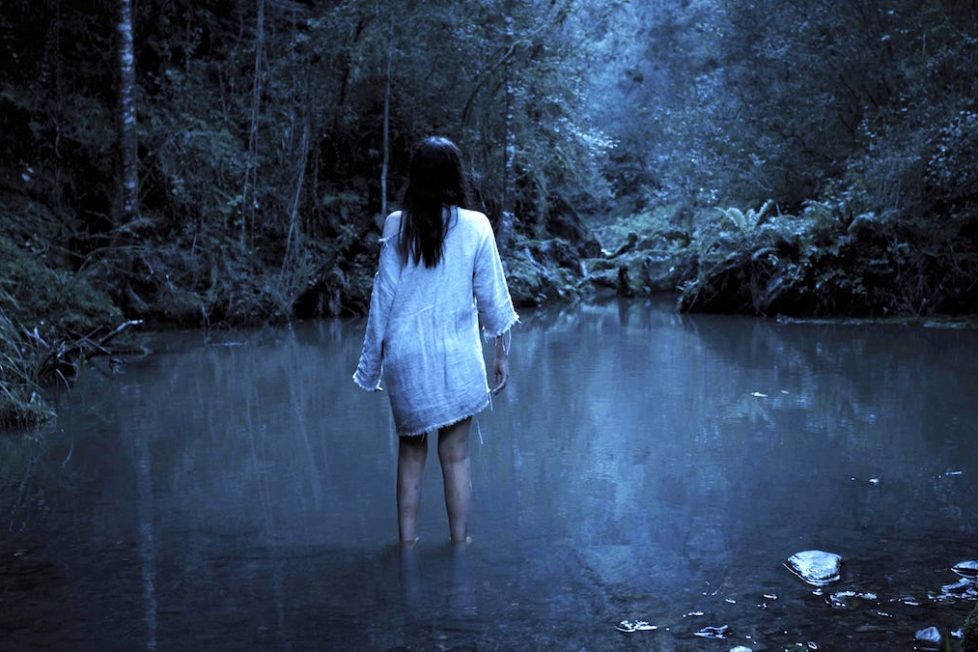GAIA (2021)
A South African forest ranger encounters two off-the-grid survivalists, who soon reveal an alarming devotion to the forest.

A South African forest ranger encounters two off-the-grid survivalists, who soon reveal an alarming devotion to the forest.


What if there is a God, and he–she, it?– just doesn’t care much about us at all? That’s the source of terror underlying the more overt body-horror of Gaia, a superbly disconcerting trip into the South African forest from director Jaco Bouwer.
Publicity makes reference to Ari Aster’s Midsommar (2019) and Alex Garland’s Annihilation (2018), but Gaia has little in common with either apart from some visual flourishes (e.g. the upside-down-camera trick that Aster uses so effectively, and the memorable fusion of plant and human life in Garland’s film).
What it does resemble, more strongly, is Ben Wheatley’s In the Earth (2021), and even the basic premise is similar: a professional custodian of nature (in Wheatley’s film a soil scientist, here a forest ranger) encounters people living deep in the trees with fierce spiritual convictions about the natural world.
The difference is that while in Wheatley’s movie these might merely be superstitions or off-the-wall theories, Bouwer leaves little room for doubt that they’re right. Barend (Carel Nel) might at first seem easy to write off as an eccentric, but Gabi (Monique Rockman)—whose gradual discovery of the truth parallels the audience’s—eventually must acknowledge that something beyond her previous beliefs is going on in the soil. Nature finds a way.
The film begins with Gabi and her colleague Winston (Anthony Oseyemi) travelling into the forest on a boat. Gabi sends a drone into the woods, seeing from its camera that it encountered a person, before it crashes and she goes to retrieve it. (Ironic, in light of later events, that she thinks a small piece of human litter will make much difference to the immense power she doesn’t yet realise resides here). She and Winston become duly separated, and indeed he plays little further role in the story, which becomes a three-hander as an injured Gabi is taken in by Barend and his son Stefan (Alex van Dyk).
As with In the Earth, the limited cast is paralleled by a constrained setting—one interior (Barend and Stefan’s shack) and the small area of the forest where they live. Quite a bit of extreme close-up, much of it depicting the natural world in fascinating detail but also extending to small human acts like Stefan placing his muddy fingers on Gabi’s leg, adds to the general sense of claustrophobia. Whether Gabi’s trapped by the two men or simply by circumstances, the feeling is oppressive, and Bouwer along with cinematographer Jorrie van der Walt exploit the inherently sinister, otherworldly qualities of fungi–which are neither animals nor plants. Although Gaia doesn’t make the obvious references to the COVID-19 pandemic that In the Earth did, it’s easy enough to see an allusion to viruses.
Gaia isn’t really a character study, more interested in ideas than individuals, but Rockman and Nel—who have the biggest parts—both deliver them assuredly. She’s firmly committed to civilisation and conventional rationality (at one point she shows Stefan her phone, expecting him to marvel at it, and she wants to take him back to the city to “civilise” him), and Rockman gives her just the right mix of confidence in her own rightness, and vulnerability in a new and unfamiliar context. Nel’s Barend is more extreme, and indeed perhaps he overdoes the crazy-eyed staring a little, but he’s genuinely scary in a big hate-filled speech (“the creatures are crawling in their cages of shit, clinging to dream worlds on silicon screens”).
They’re complete opposites. “Imagine, there was a time when the whole world looked like this,” Gabi says early on, betraying an almost Romantic view of the wilderness (the movie was shot on location in South Africa’s Tsitsikamma Forest), but Barend instead sees in it a kind of transcendent awful cruelty (“wish for mercy, a swift end to the Anthropocene”). Between them, though, is the young man Stefan, raised in the forest but clearly enticed by Gabi’s promise of wonders beyond it; he’s a more important character than he seems at first, and by the conclusion his dilemma has become central. Just as Gabi’s discoveries reflect the audience’s so, too, does the choice he has to make between two opposing world views.
There is some decidedly disturbing imagery in Gaia, much of it involving plant or fungal life (as well as a brief and ghastly Exorcist-style spider walk). The dream sequences are unusually effective, too—and it helps a great deal that they’re brief and non-narrative, as well as nasty, in a genre where many film-makers try to pack too much into dreams.
But alongside the photography and the strongly realised characters, the real star is the score by Pierre-Henri Wicomb, which is perhaps the tiniest bit over-present but immensely varied and imaginative in providing a background of perpetual disquiet—hums, roars, yelps, white noise, bellows, bangs, rattles—that is sometimes hard to distinguish from the animal sounds of the forest.
Gaia’s screenplay, by Tertius Kapp, occasionally strays into belabouring the point (Stefan not knowing the word “love”, for example) and conversely seems unsure what to do with a subplot concerning other, more overtly horrifying forest dwellers. They may be hints at the future of the human race, in which case it’s not a pretty one, but though it would sacrifice a handful of jump scares Gaia would probably have worked even better without them.
These are all minor flaws, however, and there are few of them to distract from the compelling and unsettling story told in what must surely be one of the indie horror movies of the year.
SOUTH AFRICA | 2021 | 96 MINUTES | 4:3 • 1.55:1 • 1.78:1 • 2:1 | COLOUR | ENGLISH • AFRIKAANS

director: Jaco Bouwer.
writer: Tertius Kapp.
starring: Monique Rockman, Carel Nel, Alex van Dyk & Anthony Oseyemi.
